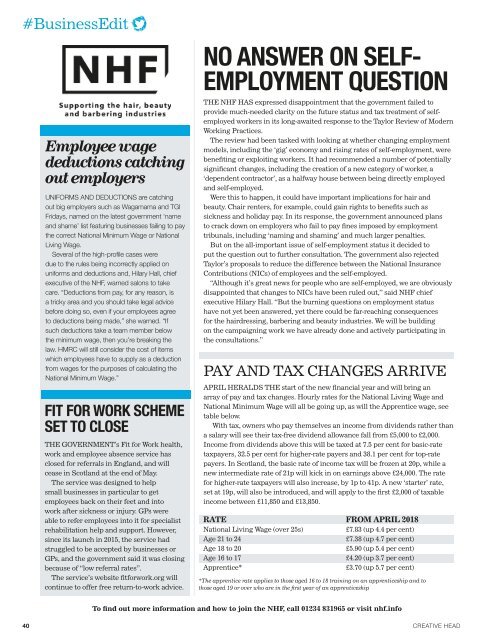Creative HEAD UK April 2018
Create successful ePaper yourself
Turn your PDF publications into a flip-book with our unique Google optimized e-Paper software.
#BusinessEdit<br />
Employee wage<br />
deductions catching<br />
out employers<br />
UNIFORMS AND DEDUCTIONS are catching<br />
out big employers such as Wagamama and TGI<br />
Fridays, named on the latest government ‘name<br />
and shame’ list featuring businesses failing to pay<br />
the correct National Minimum Wage or National<br />
Living Wage.<br />
Several of the high-profile cases were<br />
due to the rules being incorrectly applied on<br />
uniforms and deductions and, Hilary Hall, chief<br />
executive of the NHF, warned salons to take<br />
care. “Deductions from pay, for any reason, is<br />
a tricky area and you should take legal advice<br />
before doing so, even if your employees agree<br />
to deductions being made,” she warned. “If<br />
such deductions take a team member below<br />
the minimum wage, then you’re breaking the<br />
law. HMRC will still consider the cost of items<br />
which employees have to supply as a deduction<br />
from wages for the purposes of calculating the<br />
National Minimum Wage.”<br />
FIT FOR WORK SCHEME<br />
SET TO CLOSE<br />
THE GOVERNMENT’s Fit for Work health,<br />
work and employee absence service has<br />
closed for referrals in England, and will<br />
cease in Scotland at the end of May.<br />
The service was designed to help<br />
small businesses in particular to get<br />
employees back on their feet and into<br />
work after sickness or injury. GPs were<br />
able to refer employees into it for specialist<br />
rehabilitation help and support. However,<br />
since its launch in 2015, the service had<br />
struggled to be accepted by businesses or<br />
GPs, and the government said it was closing<br />
because of “low referral rates”.<br />
The service’s website fitforwork.org will<br />
continue to offer free return-to-work advice.<br />
NO ANSWER ON SELF-<br />
EMPLOYMENT QUESTION<br />
THE NHF HAS expressed disappointment that the government failed to<br />
provide much-needed clarity on the future status and tax treatment of selfemployed<br />
workers in its long-awaited response to the Taylor Review of Modern<br />
Working Practices.<br />
The review had been tasked with looking at whether changing employment<br />
models, including the ‘gig’ economy and rising rates of self-employment, were<br />
benefiting or exploiting workers. It had recommended a number of potentially<br />
significant changes, including the creation of a new category of worker, a<br />
‘dependent contractor’, as a halfway house between being directly employed<br />
and self-employed.<br />
Were this to happen, it could have important implications for hair and<br />
beauty. Chair renters, for example, could gain rights to benefits such as<br />
sickness and holiday pay. In its response, the government announced plans<br />
to crack down on employers who fail to pay fines imposed by employment<br />
tribunals, including ‘naming and shaming’ and much larger penalties.<br />
But on the all-important issue of self-employment status it decided to<br />
put the question out to further consultation. The government also rejected<br />
Taylor’s proposals to reduce the difference between the National Insurance<br />
Contributions (NICs) of employees and the self-employed.<br />
“Although it’s great news for people who are self-employed, we are obviously<br />
disappointed that changes to NICs have been ruled out,” said NHF chief<br />
executive Hilary Hall. “But the burning questions on employment status<br />
have not yet been answered, yet there could be far-reaching consequences<br />
for the hairdressing, barbering and beauty industries. We will be building<br />
on the campaigning work we have already done and actively participating in<br />
the consultations.”<br />
PAY AND TAX CHANGES ARRIVE<br />
APRIL HERALDS THE start of the new financial year and will bring an<br />
array of pay and tax changes. Hourly rates for the National Living Wage and<br />
National Minimum Wage will all be going up, as will the Apprentice wage, see<br />
table below.<br />
With tax, owners who pay themselves an income from dividends rather than<br />
a salary will see their tax-free dividend allowance fall from £5,000 to £2,000.<br />
Income from dividends above this will be taxed at 7.5 per cent for basic-rate<br />
taxpayers, 32.5 per cent for higher-rate payers and 38.1 per cent for top-rate<br />
payers. In Scotland, the basic rate of income tax will be frozen at 20p, while a<br />
new intermediate rate of 21p will kick in on earnings above £24,000. The rate<br />
for higher-rate taxpayers will also increase, by 1p to 41p. A new ‘starter’ rate,<br />
set at 19p, will also be introduced, and will apply to the first £2,000 of taxable<br />
income between £11,850 and £13,850.<br />
RATE FROM APRIL <strong>2018</strong><br />
National Living Wage (over 25s)<br />
£7.83 (up 4.4 per cent)<br />
Age 21 to 24<br />
£7.38 (up 4.7 per cent)<br />
Age 18 to 20<br />
£5.90 (up 5.4 per cent)<br />
Age 16 to 17<br />
£4.20 (up 3.7 per cent)<br />
Apprentice*<br />
£3.70 (up 5.7 per cent)<br />
*The apprentice rate applies to those aged 16 to 18 training on an apprenticeship and to<br />
those aged 19 or over who are in the first year of an apprenticeship<br />
To find out more information and how to join the NHF, call 01234 831965 or visit nhf.info<br />
40<br />
CREATIVE <strong>HEAD</strong>


















